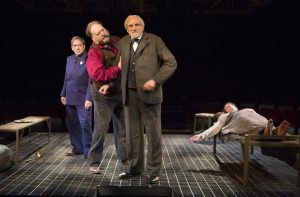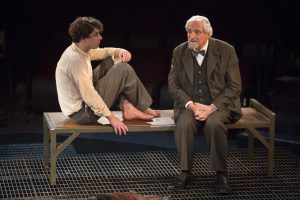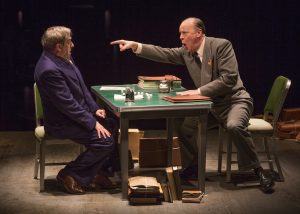Poets Face Death in Old Globe ‘The Twenty-Seventh Man’
Four poets in a cold, dank cell gradually come to understand that this will be their end, that Josef Stalin and Soviet Russia has cast them out, despite their art. Or maybe because of it.
Nathan Englander’s play The Twenty-Seventh Man, now onstage at the Old Globe’s White Theatre, is a story of courage, dignity and defiance, reportedly based on actual events in 1952 now known as “Night of the Murdered Poets.”

Robert Dorfman, Ron Orbach, Hal Linden and Eli Gelb, left to right, in The Twenty-Seventh Man at the Old Globe Theatree. Jim Cox Photos
The four fictional poets of the play– a grand old man, a celebrated Falstaffian vulgarian, a weaselly party hack and an intense young man too distracted by writing to actually publish anything – all are part of the celebrated Yiddish literary scene that bloomed after the Russian Revolution. Along with the other 23 prisoners brought in at the same time, they are meant to represent the impending violent end of a golden era not only tolerated but also celebrated by the Soviets.
The boy is an anomaly, unknown to the others, a tree that has fallen in the forest with nobody to hear. Probably he is meant to represent the future of the art being obliterated along with its present, but he offers little in the way of obvious promise other than a vague parable extolling the bliss of studying the Talmud. Perhaps there is some irony here, but Barry Edelstein’s staging is too solemn to really tell.
There’s only one possible ending to this story. Romeo and Juliet will die, James Bond will live and gunshots will ring out at the Globe. Another few bricks in the wall of Russian anti-Semitism that many of us know from personal experience.
Except, not so fast.
A quick look at Russian history of the period uncovers what seem to be significant variances in this story. There were 13 Soviet Jews rounded up, not 27, and only five were writers. Others included journalists, bureaucrats and a physician. They were not arrested one night and shot the next but, instead, underwent three years of torture and interrogation before their military trials for espionage and treason and their execution.
Most interesting, there apparently were several additional prominent Yiddish writers who were not arrested in the “Night of the Murdered Poets.”
Since Englander’s play is obviously fictionalized, even major variations from historical facts are permissible. But his selective use of the period atmosphere raises questions.
In the play, there is a casual attitude towards the specifics of the criminal charges and a cold assumption of the proceedings’ conclusion. A scene between the lead prosecutor and the protesting communist conformist sags into little more than impatient word games. Whether the horrible inevitability in the play is more gruesome than the extended outrages of the historical record is a matter of opinion. But they’re not the same. And, to earn the right of manufacturing vivid fictions, the play needs to likewise stand upon its own reality.
I realize that the entire issue of Jewish cultural survival in the middle of the 20th Century is an intensely charged subject. And I certainly don’t want to be in the position of defending a loathsome paranoid like Stalin. (He also purged medical doctors shortly before his death.)
But before I grant this play status for its aspirations to universality, I need to know its intentions. Is this a celebration of human resilience under pressure or is this another appeal for pity on behalf of the Jews? I can support either but I prefer to consider them separately.
A first-class cast has been assembled by Old Globe Artistic Director Edelstein, who also staged the work’s 2012 world premiere at New York’s Public Theatre. The roles may be fictional but the characters on the stage live and breathe.
Veteran Hal Linden plays the old man of the group, reflecting a long and celebrated career turning smoothly toward the simplicity of a dignified conclusion. Robert Dorfman is the insufferable sycophant, sporting a Lenin badge and the supercilious bullying of he who spits down and kisses up. The large and fleshly Ron Orbach plays the earthy author like a keen Russian bear and Eli Gelb is the tyro, all atremble with excitement and raging creative drives.
James Shanklin is the play’s stock character, the coolly efficient interrogator, a guard dog enjoying the execution of its masters’ orders.
The atmosphere is a claustrophobiac’s torment: cold, impersonal surfaces, sudden loud noises, lights that blind rather than illuminate. And none of it overdone. Set designer Michael McGarty’s solution to a second room is ingenious but not intrusive. Katherine Roth’s painfully accurate costumes also offer subtle commentaries.
Who would not be on the side of these writers facing martyrdom for their art? And who wouldn’t join in censuring a reign of such obvious corruption? Still, flavoring fiction with actual history requires caution, lest both suffer.
Continues in the Sheryl and Harvey White Theatre at 7 p.m. Tuesdays, Wednesdays and Fridays; at 8 p.m. Thursdays-Saturdays; and at 2 p.m. Saturdays and Sundays through March 22, 2015.




